“They Deserve to Get More Support”: The Comics Courier’s Tiffany Babb on Building a New Space for Comics Criticism
Tiffany Babb is the most passionate advocate for comics criticism I know. Part of that is because it’s her job, to some degree, as she previously was one of the editors at the Eisner Award-winning digital comics criticism magazine PanelxPanel and the deputy editor of comics and pop culture site Popverse. But she truly loves it, and more than that, she believes in its value.
And in a time of great turmoil for writing about anything, but perhaps most of all writing criticism about comics — as there’s little opportunity and very little of it pays much of anything — Babb’s turned her passion into something real and incredible. It’s The Comics Courier, a comics criticism newspaper where she features a variety of writers in each edition talking about whatever comics they’re passionate about. That’s right: We are talking about an actual physical newspaper. It’s cool as heck, and a manifestation of Babb’s love of the game, as she did her best to showcase what comics criticism can be if given a little structure and support.
And the good news is, the first issue’s Kickstarter revealed that people were excited to support something like this, with over 700 backers helping raise nearly $17,000 in funds. That’s a heck of a thing, and the beginning of something more for Babb. The plan is for The Comics Courier to be a biannual release, and she’s back with a second issue right now. She’s crowdfunding a new edition with notable names from the criticism space like Hassan Otsmane-Elhaou, Rob Salkowitz, Rosie Knight, and Comic Book Herald’s Dave Buesing. It’s already funded with plenty of time to go, so it’s quickly shown that The Comics Courier wasn’t a one-hit wonder. People are interested, and willing to support the work financially.
With that new Kickstarter live, I thought it was time to dig into The Comics Courier with Babb. So, we recently hopped on Zoom and had a sprawling conversation about the stress of the experience, the origins of the project, how she builds out the writers and artists who are featured in the newspaper, how it fits what she wants more of in the comics criticism space, how she views the world of writing about comics, and a whole lot more. It’s a delightful chat, and one that’s been edited for length and clarity.
You can read the full conversation below, as it’s open to non-subscribers. But if you enjoy what you read, maybe consider subscribing to SKTCHD for more just like it.
It’s the morning of the launch of The Comics Courier’s second issue on Kickstarter. What’s your stress level right now?
Babb: It’s okay. I mean, it’s going well, right? Everyone’s being very supportive and lovely and sharing the links. It’s not like there’s no one pledging, so it feels good. But it is going to be extremely stressful until it’s over.
Did you find the first one to be pretty stressful?
Babb: Yes, but much more so because I didn’t know if anyone was going to turn out for that. This time I’m like, “Well, people turned out for the first one.” Maybe not as many will turn out for the second one, but it’s not like no one will turn out.
Kickstarters are interesting to me because the entire time, even when you get funded, people seem stressed. But are you more stressed before it launches? Because that’s just pure unknown.
Babb: It was for the first one. This one, less so, because now it’s somewhat of a known quantity. People know what it is. With the first one, you had to convince people that this is a real thing and not a scam on the internet. You have no idea. But this one I’m like, well, maybe it won’t be as successful, but it won’t make like $0. (laughs)
The good thing is people have gotten a physical thing as proof of the first one. It’s not vaporware. We know it’s a thing. So, you have that.
Babb: Yes. And it’s not like I’m going to disappear with everyone’s cash (David laughs) and…I don’t know what people do when they disappear with Kickstarter money.
You would be the worst con artist ever if your tactic was, “I’m going to scam you through a comics criticism newspaper Kickstarter.” (Tiffany laughs)
I do want to ask about the origins. Where did The Comics Courier begin?
Babb: The origins are kind of here and there. I first got the idea for a newspaper by stealing an idea. A couple years ago, I met Brian Canini at the Eisner Awards, and he and his pals run this free quarterly newspaper called The Columbus Scribbler. It’s mostly comics and one or two interviews and a couple articles. But it’s mostly publishing actual comic strips and stuff. It was just such a cool format. It was cool what they were doing.
I was just like, I should do something like that if I ever want to launch some sort of — I don’t like using the word platform, but it’s kind of what you have to use — platform, or a publication, if you will. And so, when I was leaving Popverse I was like, well, what am I going to do in the comics realm? Will I write for some site? Sure, but I should probably do something now. PanelxPanel is on hiatus, and I was like, “Well, maybe I’ll finally start that newspaper.”
And so, yeah, I started a newspaper.
There is something cool about doing something tangible. We’re recording this the morning Polygon was bought by Valnet, and so god only knows what’s going to happen with that site. Things on the internet could be lost forever. But if you have something tangible, it’s yours. You can read Jim McDermott talking about Krakoa forever.
Babb: Forever. You own it. No one’s coming to your house to take it away. And if they do, tell me. That sounds fascinating.
So, you mentioned it. You’ve worked for other outlets. You’ve even worked on another accomplished project that went rogue in PanelxPanel. What did you want to accomplish with this that maybe you weren’t elsewhere? What itch did this scratch for you that wasn’t being scratched?
Babb: Obviously, I wanted good writing. But as a freelancer, or even working at a bigger place, you get so tied to the release schedule in a way that I find immensely frustrating. Sometimes you’re reading a book, and it came out two years ago. And you know what? You still want to write about it. It’s still interesting. And yet sometimes you don’t have the space for that because it’s not going to drive the clicks like a book that’s going to come out next month or a book that came out last week.
And so obviously I assumed that everybody has the same perspective as I do. (laughs) So, I’m like, wouldn’t every writer want a place where they could just write about whatever they want? I wanted that, and when I have writers pitch me, I ask them to pitch whatever. We obviously need to make sure that five people aren’t writing about the exact same thing, but this could be something that came out last week or it could be something that came out 20 years ago. As long as you find it interesting, let’s make it interesting for the readers. And for me, I don’t need all my criticism that I read to be now now now stuff. It doesn’t have to be from 2025. I read criticism from forever. So hopefully people also feel that way when they’re reading this. (laughs)
I remember when I was first looking at the lineup of topics, I was like…Heroes in Crisis #5. I would not have expected that. I don’t know why of all things, Liam McGuire writing about Heroes in Crisis #5 was the one that surprised me. That was more recent, but it’s also the most random in some ways.
Babb: It is fun. And that is the one that people mention the most, which is funny. (laughs) You’re not the first person to say that, but I think it makes it fun and eclectic, like you just don’t know what’s going to come up next.

You get pitches from writers, you approve the pitches, and once you get to a point where they’re in a good spot, what ground rules do you give them for writing?
Babb: Nothing. I give them a word count because this is print, and we can’t have 10,000 words. (laughs) That would be the whole newspaper. But yeah, nothing really. I feel like as an editor, if someone pitches you something and the idea is too big, you have to say, “This idea is too big.” You’re not going to be able to do this in 1,200, 1,400 words. If the idea is too small, you can kind of give some notes that way. If the pitch itself feels like it’s not the right shape for a piece of that length, that’s always the first fire that you put out.
But yeah, no guidelines. I feel like that’s also kind of part of this thing where, obviously this isn’t a collective in the way that everyone owns a bit of it, or everyone owns how the publication works. Obviously, I’m the decision maker. But it kind of has that collective feel where everybody’s doing their own thing and I’m just looping it together so it’s readable and of a certain quality and the spelling’s right and stuff. (laughs)
Do you decide the word count based on what they’re writing about?
Babb: No. All the features get the same frame. All the reviews get around the same frame.
That was one thing I noticed. Jim’s one was pretty long, but then you look at something like what Brad and Lisa Gullickson wrote. That one was much shorter, but I guess the difference is some people are writing features versus reviews. Or your interview with Patrick Horvath, that one’s going to be longer because it’s a feature piece.
Babb: Yeah, and it’s funny because obviously not everything fits exactly into the word count that you’re expecting, and so you do have to work around that. I did write an extra review to fill up a page because someone else’s piece was shorter. (laughs)
Was that SuperMutant Magic Academy?
Babb: It was.
Nice. That’s a great comic.
You mentioned The Columbus Scribbler as an influence, but there were a number of ways you could have taken this. It could have been a magazine, could have been a zine. What was it specifically about the newspaper that made it right?
Babb: Newspapers are cool. They come with such a good aesthetic and there’s not as much pressure to get the design right, which is important to me because I’m not a designer and I don’t what I’m doing. I literally got three guidebooks on how to lay out newspapers. (laughs) I was just like, “Okay, fonts should be this big and this is what the column sizes should be.” It was a lot easier for me because I was laying it out. I’ll be laying out this one to. I don’t think I’ll be laying out the next one. (laughs) There’s budget. I’m hiring someone because I am no good at this. I mean, I think it looks decent. I think it is a readable product, but it is so difficult on my end because I don’t know what I’m doing. (laughs)
Yeah, I think it looks great. I understand where you’re coming from. There’s a reason why I go with Amber, my wife, to design the SKTCHD BOOKS that we do. If I didn’t, it would take a long time and it would look way worse.
Babb: Yes. And I’m learning a new design program because I laid out the first issue in Canva, and there are a lot of problems with that.
Oh my god, you did it in Canva?
Babb: Yes, I did it in Canva, which, by the way, the columns do not roll over. So, I had to copy and paste text directly into columns. Hass(an Otsmane-Elhaou) was just like, “You need to stop. For the second one, you cannot do this. Just learn a program.” So, I’m learning a program, which obviously slows me down again, but it is definitely better because the columns do roll over and you can do page numbers and a lot of useful things that you want to use when you’re laying out a newspaper.
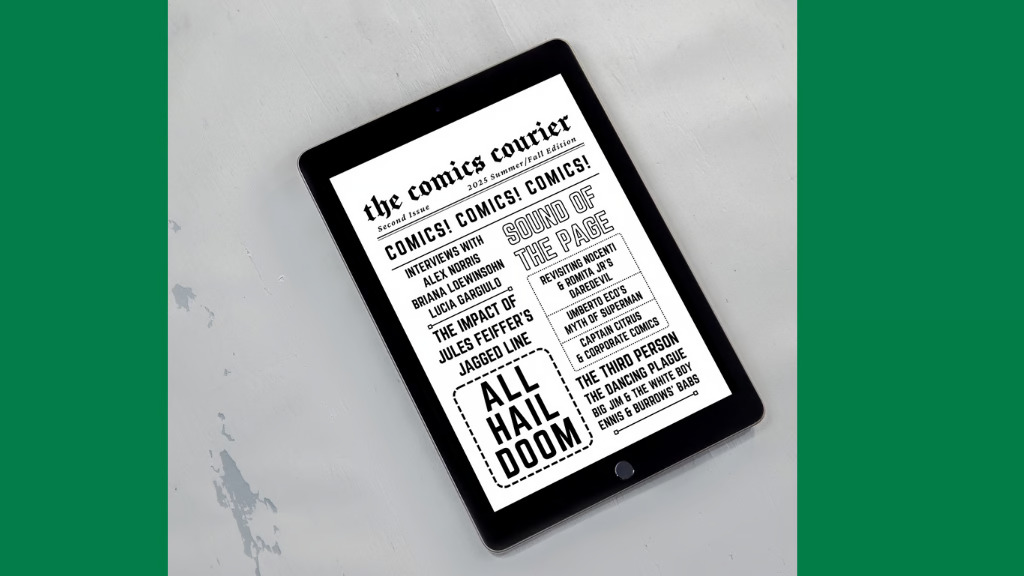
I am even more impressed now that I know you did it in Canva. (laughs)
Babb: It was rough. I’m not going to lie. It’s rough now. There are a lot of stressful, boring, and annoying parts of running a Kickstarter and putting this together, but nothing is more stressful and boring than laying it out.
You mentioned Kickstarter. Did you know you were going to Kickstart it before you had started putting the paper itself together?
Babb: Yes, because there’s no way I would make enough sales to shops or direct sales to make it even cover the print run, let alone pay people. Kickstarter is nice. Obviously, you get the money ahead of time, but you also get a big buffer of cash because you are offering rewards and stuff and people are paying extra to get rewards, and so you get more money. (laughs)
I wanted to ask about the writers for both the first and second issues. How do you figure out which writers you want to feature? I assume it starts with “not David Harper” and then it goes from there. But what is the process really?
Babb: Well, yeah, at the top of every page I write “not David Harper” first. (laughs) But really, I just make a list. I’ve made a list of comic critics. I know comic critics whose work I like. I would say maybe a little more than half are people I’ve worked with before. And then the other chunk are people I haven’t worked with before. So I like to keep that a mix too, so it’s not just add the same people. And I think for the first few issues at least, I want to have a decent mix of different writers before I draw from the same well again, just so we can get as many people involved as possible.
You look through the list of the first newspaper, and there’s you, there’s Hass, there’s critics like Sean Dillon and Liam McGuire, and then there’s historian Douglas Wolk, there’s podcasters in Brad and Lisa Gullickson, and then there’s Dave Baker, a creator. I really like that you feature a variety of voices coming from a variety of roles. That makes it a bit more interesting.
Babb: I think so too. I mean, that’s the cool thing about criticism. Anybody can do it. Obviously to be a professional who does it all the time, it’s quite different, but everybody has an opinion, and especially in comics, everybody has that one thing they’ve been dying to write about. And Dave Baker’s piece, he’s obsessed with those Star Trek comics, and so he was just like, “Let me write about this.” I’m just like, “Yeah, go ahead.” He does a bunch of interesting writing beyond his comics.
It had a very Dave Baker title. “The New and Deeply Strange Frontier, or How John Byrne Stopped Drawing and Learned to Love the Lasso Tool.” Most of the time writers don’t write their own headlines. That had to be Dave.
Babb: That is very Baker-esque.
You’re a baseball fan. I think the interesting thing about you is…baseball fans, especially veteran ones, have this purity to their love of it. There’s beauty to the game. There’s a passion that goes beyond just, “This is people throwing and hitting a ball.” You have that baseball love for comics criticism. Why do you love comics criticism so much? Why do you want people to see what you see in it?
Babb: I feel like I have a passion for criticism in general, but the thing with comics criticism is it’s like the forgotten sibling. It’s…
Underloved.
Babb: It’s underloved. It’s underappreciated. People shit on it all the time. Everybody does. Professionals do. Creators do. And it’s so frustrating because I see the amount of passion that goes into it, and I have had a very lucky amount of time in comics where I was able to make some amount of money off of it. I was able to…I don’t even want to say recognition; it’s not like I’m famous. But I am able to launch a Kickstarter and people come and back it. I have at least that much in this space.
And so many people don’t have the opportunity to do that just because you can only have so many eyeballs pointing in so many directions. And so, it’s almost like a righteous rage. These people are already downtrodden, they’re already doing this out of the love of their art, and they deserve to get more support, whether that’s monetary or even reading the work or even just generally supporting the work, which I just don’t think is out there as much as it should be.
So, you want to make the newspaper because you want to make the newspaper, but also in a way it’s like you’re trying to elevate how people see comics criticism to some degree.
Babb: I don’t know if that’s because, I don’t know if people’s minds will change at all. (laughs) I feel like that is a losing battle. I’m just angry. I don’t know if I’m going to change anyone’s minds, but I think with The Courier, instead of changing people’s minds, it’s more like I’m treating — in my opinion, who knows, maybe the writers all hate working with me —the writers that I work with the way that I think they should be treated. They shouldget some payment. It’s not like New York Times payment, but for comics criticism, it’s alright. They get “good editing.” I say in quotes, again. I don’t know. Maybe they think my editing’s horrible. They hopefully get a decent layout and a nice publication to be in, which I think more writers deserve and it’s just not there.
One of the rare things you offer people too is freedom to write about what they’re passionate about. And I think that makes a real difference. I’ve done that slog where you’re writing previews, reviews and news, and it burns you out and it takes the fun away from it to some degree. And so being able to chase your passion, whether it’s Heroes in Crisis #5 or SuperMutant Magic Academy, you’re embracing it. That makes a huge difference.
Also, while you may not have changed people’s minds…maybe you did, I don’t know…but one thing that really…I don’t want to say surprised me, but it was encouraging to see how many people vocally backed The Comics Courier during its first run. It may be happening this morning. We’re still recording. I just woke up in Alaska. But were you surprised at all by the response and the support the first one received?
Babb: Yeah. I mean, we were talking about this earlier, but you don’t know if anyone’s going to show up. And to be honest, I was expecting some amount of people to show up, but I did expect it to be my friends or colleagues who know me and have to back it out of a personal obligation. (laughs) I was surprised that first of all, so many people backed publicly. A lot of industry people obviously, which was amazing. But also, just a ton of strangers. I expected it to be like me and my 30 friends and colleagues all put in maybe a sponsorship, but maybe a print pack or something.
So, I wasn’t expecting not to get funded at all, but the fact that a bunch of people just bought the newspaper and nothing else, that was such a surprise to me. These are all hundreds of people I don’t know. They just wanted that newspaper. That’s really nice. That means people want this.
We talked about the reasons why you’d go with a newspaper. I don’t think I ended up mentioning it, but one thing that’s nice about the newspaper is you can keep it pretty inexpensive. You’re able to make it $9 and that’s fantastic.
Just looking at your sponsors, the fact that you got Oni Press, Ram V, Bindings — the app from Kenny Meyers — Cliff Chiang, Heather Antos, and a whole bunch of other people, that’s amazing. They wanted it, but they were also like, I want to support something like this beyond a purchase. It almost became a focal point for people who believe we need more of this.
Babb: Yeah. And that’s exciting because I was mentioning creators shitting on writers earlier, but not all of them are, right? A lot of them are huge advocates for this kind of work, and I’m very appreciative of that. It’s been really cool to see that directed towards the newspaper.
And I’m sure there’s a whole bunch of people who wanted that Lee Gatlin print. (Tiffany laughs)
Babb: Oh my gosh. There’s a Venn diagram of people who knew what The Comics Courier was and people who knew this was the only way I can get the limited-edition Lee Gatlin print. Now they have it, and his print actually says The Comics Courier. Now all these Lee Gatlin collectors have this print that says The Comics Courier.
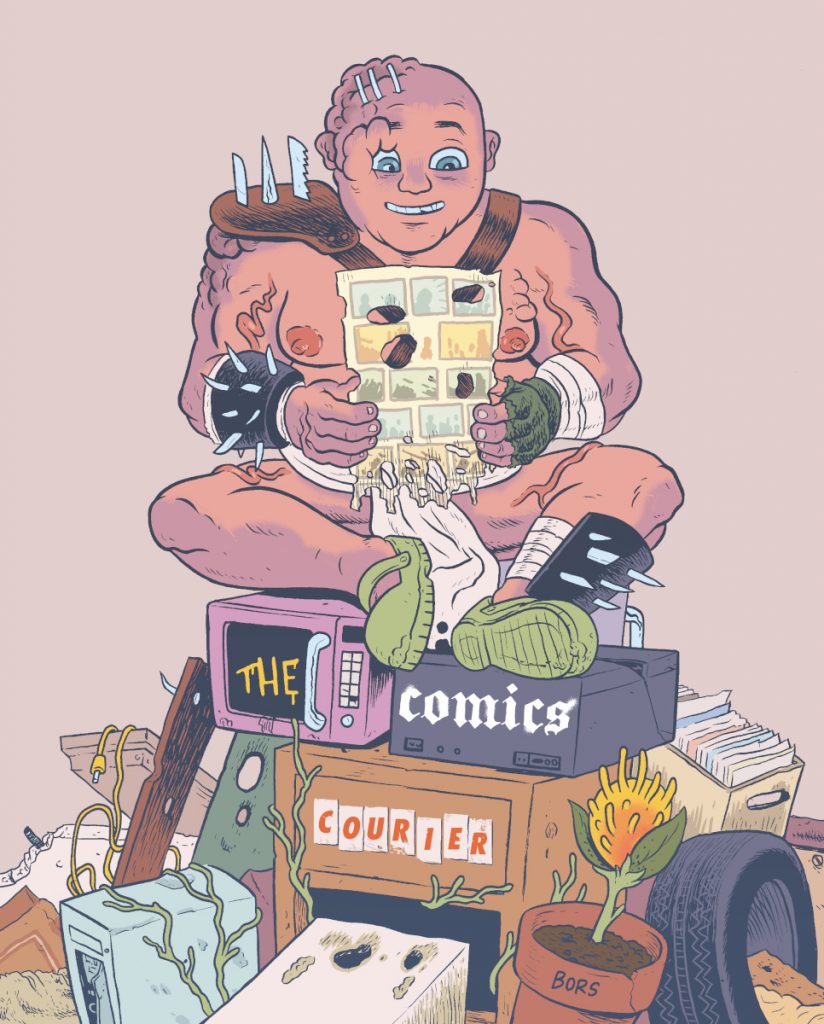
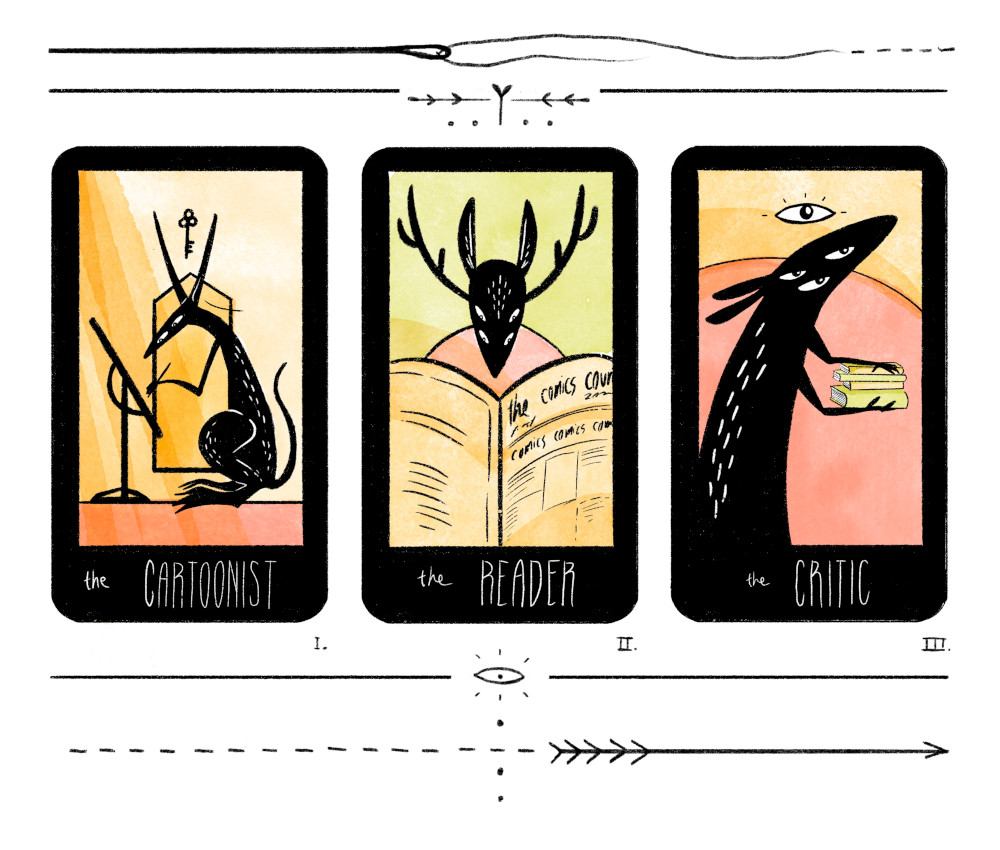
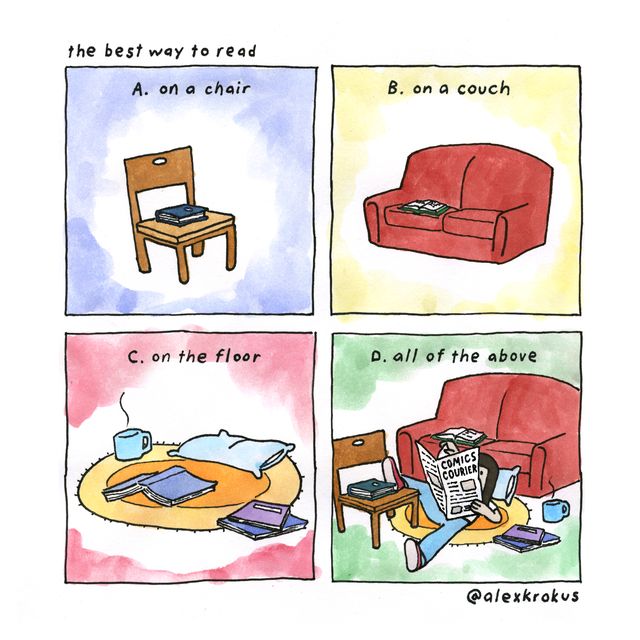
You’re on the second one now. How do you decide who you want for the prints? Because both have had very eclectic artists. The first one had Dave Baker, Lee Gatlin, and Nicole Goux, but how did you decide who would be the print artists on the second one?
Babb: It’s very similar to choosing the writers. I have a list. Some people will say no due to time, or maybe they hate me or something. But it’s mostly due to time and stuff. But every comics critic is accessible to something like this. Not every artist is accessible. (laughs) So, I make a list of people who I think would do something like this, and then I reach out to people. There are people who were like, “Yes, but not now” who I’ll probably touch base with next year. And then there are people who said yes, and we have really these prints. This time Alex Krokus, which is a…
Really good one.
Babb: It’s so funny. His books crack me up. Then Shing Yin Khor, whose work is really cool. They did these tarot card designs for the print. And then Matt Bors. They’re all cool prints. When you talk to an artist, you’re just like…I kind of say, “Do whatever. It doesn’t have to say The Comics Courier, but have some sort of theme that’s somewhat tied to comics or newspapers. But beyond that, I’m just like, “Do whatever.” And then when they turn things in, I’m just like, “Whoa! That’s so cool!” I would not have expected tarot card designs. But now we have them and they’re really cool.
The second issue of The Comics Courier is live on Kickstarter. Beyond, “I’m not doing this on Canva again,” what was the biggest thing you learned from the first issue and its success that you carried into this one?
Babb: That is a good question. I don’t know. Beyond the Canva thing, I’m mostly doing exactly the same thing. I’m trying to stop saying that I’m an error prone person because I feel like the identity is limiting me. (laughs)
I’ll tell you a funny story about my error prone-ness, which is last time, and I’m going to be a Q Con this weekend, and I’ll be selling seconds of the reporter’s notebooks that are kind of poorly printed. I screwed up the imaging because again, I don’t know what I’m doing. And this time my big error was I ordered the pencils and the first order of pencils I was doing were going to say The Comics Courier but said The Comic Courier.
And I’m just like, oh my God, I’m so error prone, whatever. I decide to change the design to say, “Read comics criticism,” which is what we’re going with now. They come and say, “Read comic criticism.” And at this point I’m like, wow, I’m just typo haven, which is not untrue on a general thing, but I was triple checking. So, I go and look. This company doesn’t send you a proof. It’s kind of strange. So you have no proof of your order pretty much. I go and I look at the screenshot that I took for the Kickstarter, and I was like, no, I spelled it right. And I called them and I was just like, what are the chances that they misspelled the first one? And they did misspell the first one, and it wasn’t my fault.
So, I’m no longer calling myself error prone, but I am kind of error prone, and so I’m trying to be a little more careful with things like making sure the imaging is correct, and things are high res enough and triple checking the spelling on everything because all the ordering of the rewards and stuff. I mean the ordering of these…it’s all me, right? With a paper I have people like Hass is looking at the design and he’s helping copy edit. This time I’ll have another person help copy edit as well. But other than that, everything is just me and my laptop, and if there’s an error, it’s because I’m being impatient, and I’m often impatient. Errors cost money. So, I have to slow down and make sure I’m spelling everything right and then I can blame other people for when something goes wrong. (laughs)
If it’s going to be The Comic Courier, hope it’s somebody else’s fault.
Babb: I was so shocked. (laughs) I was like, “I can’t believe I misspelt the name of the newspaper.”
For the second issue, are the pieces in newspaper effectively done or does that come later?
Babb: They’re almost done. I’m trying to get shipping…talk about the stress of Kickstarter. Shipping the Kickstarter sucked. It was so fucking awful. And part of it was I had a lot of family stuff going on at the time, so I just wasn’t home a lot. So most of the shipping happened between the hours of midnight and 3:00 AM on a couple already extremely stressful weeks. This time I’m trying to get the order in hopefully right after the Kickstarter closes. I am laying things out now and almost the entire newspaper is in. There are a couple more pieces that need to come in, but beyond that, almost everything’s in and now it’s just layouts.
That’s awesome. I was going to bring up the fulfillment part because that’s lowkey the toughest part in some ways.
Babb: Horrible.
The stress upfront is all mystery stress. The fulfillment is actual physical stress and emotional stress as you’re trying to get all these million things out.
Babb: There were fewer add-ons this time for a reason. Oh, that’s a lesson I learned: fewer add-ons.
Wait, what add-ons are missing this time?
Babb: I didn’t do add-on stickers, and I didn’t do any add-on rewards. The only add-ons are the papers. You can get the first issue and an extra copy of the second issue.
That makes sense. Keep it simple. When I do the book fulfillment, it’s like Amber and I sitting in our house for one entire day just packing stuff and then doing all the shipping and then going and dropping it all off. I hadn’t figured out how to do some of the shipping stuff online originally and I would be at the post office for four plus hours. It was so painful.
Babb: Intense.
To close, you see the conversation all the time. We’ve talked about it. Writing about comics is dying. There literally was just a conversation about how comics journalism is dying, stemming from a conversation between Atom Freeman and Heidi McDonald on Atom’s podcast. And yet here The Comics Courier, succeeding. (Tiffany laughs) I mean, it is! Don’t laugh! You’re laughing at your own thing!
Do you think the experience of putting this together has given you any ideas about what this space is missing or directions it could be pushing that it isn’t currently?
Babb: Yes and no. I think the success of The Courier shows that people are interested in reading this sort of thing at a certain level of quality and that people are willing to spend money on it. However…well, let’s draw a delineating line between comics journalism and criticism. I guess criticism can be lumped into journalism, but writing about comics news wise is quite different. And The Couriers are obviously not doing that. That’s important. And it is kind of dying. It exists. People are doing the work, but not a lot of people are doing the work because there’s no money in it. Places like The Beat, which are amazing and incredibly important, people aren’t getting paid there. So, people can only do it for so much time or for so long.
With criticism, most people who are doing it are also not getting paid. Most people who are reading it are not paying for it. But I think it’s also important to note that The Courier would not exist if I did not…I’m paying myself a little bit of money. I’m paying myself around a dollar an hour. (laughs)This wouldn’t exist if I didn’t have the financial security and space and time and interest in getting paid a dollar an hour to do this.
So that’s not a fix to the problem. It’s what I can do to help the industry. It’s what I can do to edit and publish and help people get paid. But that does not solve the problem. The problem is that there’s no money. And here there is some money, but even then, it’s enough money to get people fees and it’s enough money to print the paper and it’s enough money that I’m not coming out with $0. But I couldn’t live off this. There’s not even minimum wage for me. (laughs)
In a way, it’s like volunteer work, which is important and I’m happy to do it and I want to do it because I think it’s important and I believe in it. But I don’t think it’s fixing anything. And I do think that when people say writing about comics is dying, they mean it in very different ways. Some people are like, “Well, it’s not as good as it used to be.” And some people are like, “Google has screwed us, and our clicks aren’t coming in anymore.” Everybody’s coming at it from a different perspective, and a lot of the different perspectives are right, and a lot of the different perspectives are wrong. I don’t think it’s any less dying. It lives because there are people doing the work, and that is important. I appreciate the work.
But until there is some sort of ecosystem where the work can be sustained without people working for a dollar an hour to sustain it, it’s not viable as a career for anyone. It’s not viable for the long term. Even for me, as much as I love comics criticism and I want to run The Courier for a few years at least, this is not something where I’m like, “I’m going to do this for the rest of my life.” (laughs) Because at a certain point it’s already so stressful and it’s only issue two. I don’t know, at issue 10 or 20, I’m probably going to be like, “I need to go do something that gets me paid.”
When I started criticism, there was a critic who was leaving comics criticism who wrote an essay about why she was leaving. And it was all about, she had dedicated her time to it, but at the end of the day, there’s no money and you can’t sustain a career for this long without money and support. And at the time I was like, “That’s not true. I’ll write for free for forever. (laughs) I love comics so much and I just want to write about comics.” And some people can do that forever. I mean, some people do, but a lot of people don’t. But I can write a feature about a film and make five times what I make writing a feature about a comic.
I love comics criticism. I’m glad to do this. I’m glad to be making my dollar an hour. But it is dying in many ways. And I don’t know if there’s a way to fix it any more than I think there’s a way to fix the direct market. (laughs) These are big structural problems and the number of readers and the cost of getting issues into stores, and we have a failing distribution system in Diamond. We have a failing distribution system in comic criticism too. What happened to Google, right?Suddenly nobody can find anything. And not to mention the death of Twitter, all of a sudden nobody can find anything. And that kind of stuff kills tiny industries. And as long as people are doing the work, it won’t be dead.
But is it alive?
Here’s the thing, though. You alluded to it, but people have been saying that direct market has been dying since the direct market was born. The conversation around writing about comics was the same when I started in 2009. People were like, “Comic sites were dying.” And I was like, “Okay, I’m just doing this for fun. Let’s just see what happens.”
And the entire time people are like, “Comic sites are bad” or “Comic sites are dying” as they lament the previous generation that went away. Don’t get me wrong, there are real problems that are facing all of them. The pay sucks. Visibility is terrible. But in a weird way, those are problems that have faced it the entire time that it’s existed. That doesn’t make it better, but it is kind of funny where it’s almost viewed as being in a perpetual state of near death, if that makes sense.
Babb: Yes. Or it’s just dying slowly. But some things do die. I don’t think things aren’t dying. It’s like that Brubaker and Phillips comic where they say comics have been dying since 1954.
Bad Weekend.
Babb: Yes. I love it. My favorite out of that series.
Thanks for reading this interview with The Comics Courier’s Tiffany Babb. If you enjoyed this conversation, maybe consider subscribing to SKTCHD for more like it and to support the work.
